#2018 Book Journal
Text
My one year on the street
From the book “100 Years” by Joshua Prager:
BIRTH: “Birth was the death of him.” Samuel Beckett, A Piece go Monologue
My margin note to above:
March 15, 2018
Re: Birth was the death of him” I wrote “Me!”
The Thunderstorms raged at my birth.
There was a double rainbow over 24 hour Fitness Gym parking lot last evening. I cried a bit-----
The heavens blessed my one year on the street.
(DJ’s first night in the house was 3/15/2017)
End of entry
Notes: 1/24/2024
When I was born at 7:05pm Monday June 20, 1955, a thunder storm was raging outside per my parents (confirmed by a Google search)
Between mid March and late October 2017, I had on about 10 separate occasions different homeless men stay with me in my house. They would stay in the guest room for anywhere between one night and a few weeks. I also filled up bags with food, socks, tooth brushes and other assorted street survival items and pass them out in my travels. I did this in at least 12 cities. This is what I was referring in my margin note above when I referred to “my year on the street”.
I met some of the homeless men in the parking lot area of 24 Hour Fitness (now Valley Gym) off Ben Holt Ave in Stockton California. That’s why the double rain bow had such an impact on me there.
I had some harrowing , wondrous adventures during the year on the street which I intend to detail in future blogs. It was one of the best years of my life. My homed friends said that I was going to be murdered. My clients in Jail loved my work with the homeless.
I found it to be a healing time. I was never physical injured , but I did lose lap tops, cars (taken on joy rides and returned) my wallet, an I phone. It was worth it.
I came up with the phrase “You gotta get taken to get taken to." I saw things and went places no other homed person would go. (BY homed, I mean people that have a secure place to live and a stable income) The loss of the things was a small price to pay for the insights I gained from street life encounters.
#journaling#journal#homeless work#homelessness#3/15/2018#my one year on the street#letting the homeless live in my house#the book 100 years Joshua Prager#Samuel Beckett Monolouge
14 notes
·
View notes
Text
money is so hard btw i hate it
#knowing ill have to decide between fixing my cello and paramore tickets as my Hyperfixiation Cost#its not rlly rhat but uts money i allocate to myself as like a Treat ? bc im stupud and to save money i gotta soend money on sgit i want#so . theyll cost abt the same. and ik itd a no brsiner paramors tickets#bc i can just get my cello fixed next pay cycle.#but i have been itching to play for SO LONG :(#and i thinl the longer i leave the damage to worse it gets#bc the bridge is tsped to the bridge w blu tac.#so um thars probably Not Good fornit lbr#anyway i miss my cello#found some sheet musicnim gonna print out anf practice#its mostly . old day6 n bts songs i lesnred in 2018#but . i also am gonna buy a piano book of taylor swift n . im gonna soend hours transcribing it Manually on my computer#this is gonna suck ass bc im not That Musically Inclined and i HATE creating musicnon thisnfuclijg software ngl#but i have No Choice so.#i have Plans#and bc i fucking Love checklists and to do listd i rlly dhould write this typenof shitbout in my journal thingy so i can . keep track of it#vc i did ir w my cleaning process !!#i checked off a few boxes and then added some more as i Unlocked new areas#or new tasks ig#idk sometimes i think od this shitbas a video game and it makes itbeasier toctackle
4 notes
·
View notes
Photo
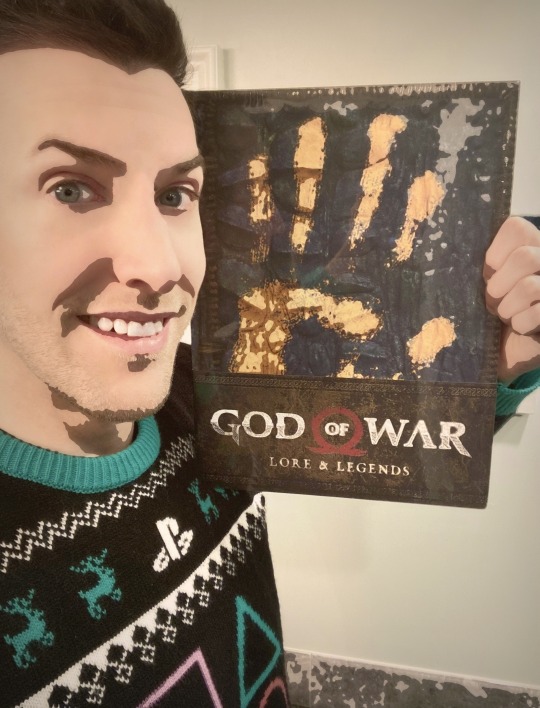
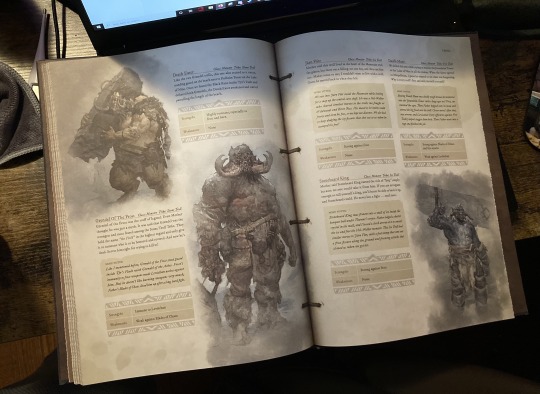
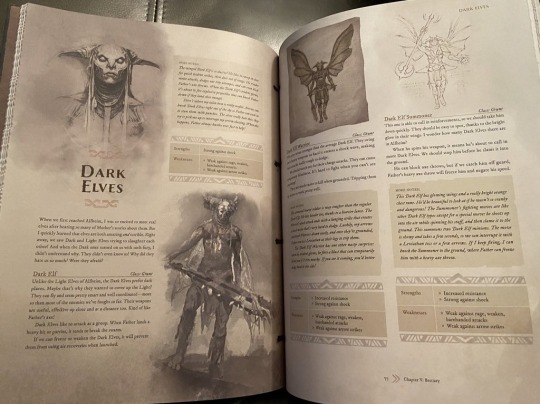
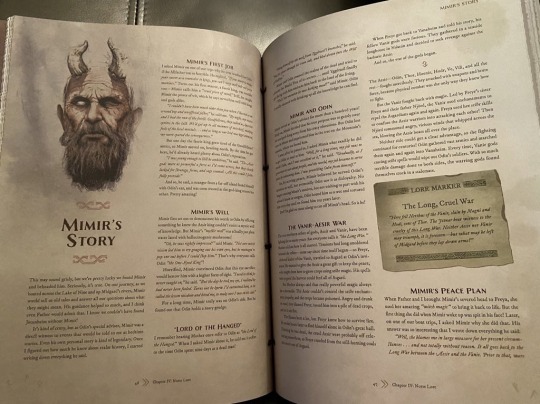
A hardcover tome that authentically recreates Atreus' journal as seen in 2018’s God of War, this book features expanded lore written in collaboration with the award-winning video game’s writing team! 📔
“God of War: Lore and Legends” invites readers to plumb the mythology of the fabled Nine Realms through the eyes of Kratos' son, from the Wildwoods of Midgard to the mountains of Jötunheim and beyond. In addition to the record of their legendary journey, this wonderous collection also includes a bestiary that was assembled during those travels, intimate dossiers of the characters that inhabit the masterfully crafted universe, and much more. A must-own item for any God of War fan, I’m very happy to have a place for it on my bookshelf!
#god of war#gow#gow 2018#kratos#atreus#journal#art book#book#books#hardcover#book collection#book collector#collecting#collection#collectibles#collector#video games#video game#gaming#gamer#lore#god of war lore and legends#bestiary#nine realms#mythology#norse mythology#norse#tome#art#video game art
11 notes
·
View notes
Text
okay i lied abt being done going thru old things ive spent the last like hour and a half clearing out my drawers bc they are a MESS and i found a “song book” of mine and it gets dark so unnervingly fast
#there’s literally a viciously scribbled out page of lyrics begging my dad to come back HELLO 💀#also several abt loneliness and guilt and losing hope how old was i when i wrote these…#this is following songs going OOOH IT’S A SCARY HALLOWEEN NIGHT and LETS DO THIS THING and WE ARE GIRLS and DANCE W ME etc#i know i got the book for my 10th birthday (i know this bc i am also reading thru a diary that starts off saying i got it + that diary for#the songs) but idk how long i continued w it. i can’t imagine it was that long tho bc i am NOTORIOUSLY bad at keeping up w journals#although admittedly this diary im reading rn does span 2013-2015 which is better than my usual track record and i got them at the same time#what’s v curious tho is the last song#draws the same comparison as the first poem i wrote and i desperately want to know if i#went back to that diary then w the thought oh i could try to make a song out of this metaphor or if i actually wrote that that long ago and#it stuck in my back of my mind the whole time#personal#actually no it must be the latter bc turns out the first poem i wrote in 2018 (thought it was much earlier) and my handwriting definitely#didn’t look like this then. that’s so interesting
2 notes
·
View notes
Text
poetry outlets that support a free palestine
after finding out that the poetry foundation/POETRY magazine pulled a piece that discussed anti-zionism because they "don't want to pick a side" during the current genocide, i decided to put together a list of online outlets who are explicitly in solidarity with palestine where you can read (english-language) poetry, including, except where otherwise stated, by palestinian poets!
my criteria for this is not simply that they have published palestinian poets or pro-palestine statements in the past; i only chose outlets that, since october 7, 2023, have done one of the following:
published a solidarity statement against israeli occupation & genocide
signed onto the open letter for writers against the war on gaza and/or the open letter boycotting the poetry foundation
published content that is explicitly pro-palestine or anti-zionist, including poetry that explicitly deals with israeli occupation & genocide
shared posts that are pro-palestine on their social media accounts
fyi this is undoubtedly a very small sample. also some of these sites primarily feature nonfiction or short stories, but they do all publish poetry.
outlets that focus entirely on palestinian or SWANA (southwest asia and north africa) literature
we are not numbers, a palestinian youth-led project to write about palestinian lives
arab lit, a magazine for arabic literature in translation that is run by a crowd-funded collective
sumuo, an arab magazine, platform, and community (they appear to have a forthcoming palestine special print issue edited by leena aboutaleb and zaina alsous)
mizna, a platform for contemporary SWANA (southwest asian & north africa) lit, film, and art
the markaz review, a literary arts publication and cultural institution that curates content and programs on the greater middle east and communities in diaspora
online magazines who have published special issues of all palestinian writers (and all of them publish palestinian poets in their regular issues too)
fiyah literary magazine in december 2021, edited by nadia shammas and summer farah (if you have $6 usd to spare, proceeds from the e-book go to medical aid for palestinians)
strange horizons in march 2021, edited by rasha abdulhadi
the baffler in june 2021, curated by poet/translators fady joudah & lena khalaf tuffaha
the markaz review has two palestine-specific issues, on gaza and on palestinians in israel, currently free to download
literary hub featured palestinian poets in 2018 for the anniversary of the 1948 nakba
adi magazine, who have shifted their current (october 2023) issue to be all palestinian writers
outlets that generally seem to be pro-palestine/publish pro-palestine pieces and palestinian poetry
protean magazine (here's their solidarity statement)
poetry online (offering no-fee submissions to palestinian writers)
sundog lit (offering no-fee submissions to palestinian writers through december 1, 2023)
guernica magazine (here's a twitter thread of palestinian poetry they've published) guernica ended up publishing a zionist piece so fuck them too
split this rock (here's their solidarity statement)
the margins by the asian-american writers' workshop
the offing magazine
rusted radishes
voicemail poems
jewish currents
the drift magazine
asymptote
the poetry project
ctrl + v journal
the funambulist magazine
n+1 magazine (signed onto the open letter and they have many pro-palestine articles, but i'm not sure if they have published palestinian poets specifically)
hammer & hope (signed onto the letter but they are a new magazine only on their second issue and don't appear to have published any palestinian poets yet)
if you know others, please add them on!
4K notes
·
View notes
Text
i usually read abt 20 books a year and this year i only read 10 and im so sad abt it
#books#books and reading#reading#i just updated my reading journal#that ive been making since 2018#and this is the least amount of books#I've read in a year#the last 2 years of high school suck#i dont have time#for anything
0 notes
Text

This is a tempting parallel to draw, but it doesn’t tell a whole or accurate story.
The idea of autogynephilia isn’t just the idea that lesbian trans women transition because they think lesbianism is sexy so they want to be lesbians for sex reasons.
Autogynephilia is part of a larger sexological theory, dreamed up by a specific individual named Ray Blanchard, that there are two types of trans woman: the “homosexual transsexual”, who is male-attracted, and the “non-homosexual transsexual”, who exhibits autogynephilia - a sexual fetish for being a woman that’s also a romantic orientation toward oneself-as-a-woman that’s also a type of fantasy about female embodiment or crossdressing or doing traditionally feminine activities like having sex with men.
The theory of autogynephilia comes loaded with a bunch of other particular and nonsensical ideas, including but not limited to the idea of the “erotic target location error” and “erotic target identity inversion”, the idea that all erotic crossdressing fantasies are fantasies of being the gender one dresses as, and the idea that bisexuality in trans women is attributable to “meta-attraction” in which the women are not actually attracted to men but only to the sense of femininity that sex with men can grant them.
Blanchard and his associates J. Michael Bailey and Anne Lawrence have been responsible for propagating this concept of autogynephilia across numerous academic journals articles and multiple books over the past 34 years, including Lambda Award nominee The Man Who Would Be Queen.
The idea of gay trans men transitioning because they like BL
mostly manifests as the idea that young people who were assigned female at birth are experiencing a form of social contagion or susceptibility to media influence rather than a deep-set paraphilia (the way autogynephilia has traditionally been theorized),
has mostly emerged in a vernacular way inside of trans communities and as an explanation for offspring’s transgenderism by transphobic parents, rather than as a formal sexological concept (Blanchard didn’t pick up the torch on “autohomoeroticism” until something like 2018, well after trans people had been commenting on the idea for years), and
has not had the reach or impact the theory of autogynephilia has had.
It’s not the worst comparison in the world, but assuming 1:1 mirroring between the situation with autogynephilia and the situation with gay-tboys-are-just-doing-it-because-they-read-too-much-yaoi would produce a lot of incorrect assumptions about whichever the thinker is less familiar with.
475 notes
·
View notes
Note
hi! SUPER interesting excerpt on ants and empire; adding it to my reading list. have you ever read "mosquito empires," by john mcneill?
Yea, I've read it. (Mosquito Empires: Ecology and War in the Greater Caribbean, 1620-1914, basically about influence of environment and specifically insect-borne disease on colonial/imperial projects. Kinda brings to mind Centering Animals in Latin American History [Few and Tortorici, 2013] and the exploration of the centrality of ecology/plants to colonialism in Plants and Empire: Colonial Bioprospecting in the Atlantic World [Schiebinger, 2007].)
If you're interested: So, in the article we're discussing, Rohan Deb Roy shows how Victorian/Edwardian British scientists, naturalists, academics, administrators, etc., used language/rhetoric to reinforce colonialism while characterizing insects, especially termites in India and elsewhere in the tropics, as "Goths"; "arch scourge of humanity"; "blight of learning"; "destroying hordes"; and "the foe of civilization". [Rohan Deb Roy. “White ants, empire, and entomo-politics in South Asia.” The Historical Journal. October 2019.] He explores how academic and pop-sci literature in the US and Britain participated in racist dehumanization of non-European people by characterizing them as "uncivilized", as insects/animals. (This sort of stuff is summarized by Neel Ahuja, describing interplay of race, gender, class, imperialism, disease/health, anthropomorphism. See Ahuja's “Postcolonial Critique in a Multispecies World.”)
In a different 2018 article on "decolonizing science," Deb Roy also moves closer to the issue of mosquitoes, disease, hygiene, etc. explored in Mosquito Empires. Deb Roy writes: 'Sir Ronald Ross had just returned from an expedition to Sierra Leone. The British doctor had been leading efforts to tackle the malaria that so often killed English colonists in the country, and in December 1899 he gave a lecture to the Liverpool Chamber of Commerce [...]. [H]e argued that "in the coming century, the success of imperialism will depend largely upon success with the microscope."''
Deb Roy also writes elsewhere about "nonhuman empire" and how Empire/colonialism brutalizes, conscripts, employs, narrates other-than-human creatures. See his book Malarial Subjects: Empire, Medicine and Nonhumans in British India, 1820-1909 (published 2017).
---
Like Rohan Deb Roy, Jonathan Saha is another scholar with a similar focus (relationship of other-than-human creatures with British Empire's projects in Asia). Among his articles: "Accumulations and Cascades: Burmese Elephants and the Ecological Impact of British Imperialism." Transactions of the Royal Historical Society. 2022. /// “Colonizing elephants: animal agency, undead capital and imperial science in British Burma.” BJHS Themes. British Society for the History of Science. 2017. /// "Among the Beasts of Burma: Animals and the Politics of Colonial Sensibilities, c. 1840-1940." Journal of Social History. 2015. /// And his book Colonizing Animals: Interspecies Empire in Myanmar (published 2021).
---
Related spirit/focus. If you liked the termite/India excerpt, you might enjoy checking out this similar exploration of political/imperial imagery of bugs a bit later in the twentieth century: Fahim Amir. “Cloudy Swords” e-flux Journal Issue #115. February 2021.
Amir explores not only insect imagery, specifically caricatures of termites in discourse about civilization (like the Deb Roy article about termites in India), but Amir also explores the mosquito/disease aspect invoked by your message (Mosquito Empires) by discussing racially segregated city planning and anti-mosquito architecture in British West Africa and Belgian Congo, as well as anti-mosquito campaigns of fascist Italy and the ascendant US empire. German cities began experiencing a non-native termite infestation problem shortly after German forces participated in violent suppression of resistance in colonial Africa. Meanwhile, during anti-mosquito campaigns in the Panama Canal zone, US authorities imposed forced medical testing of women suspected of carrying disease. Article features interesting statements like: 'The history of the struggle against the [...] mosquito reads like the history of capitalism in the twentieth century: after imperial, colonial, and nationalistic periods of combatting mosquitoes, we are now in the NGO phase, characterized by shrinking [...] health care budgets, privatization [...].' I've shared/posted excerpts before, which I introduce with my added summary of some of the insect-related imagery: “Thousands of tiny Bakunins”. Insects "colonize the colonizers". The German Empire fights bugs. Fascist ants, communist termites, and the “collectivism of shit-eating”. Insects speak, scream, and “go on rampage”.
---
In that Deb Roy article, there is a section where we see that some Victorian writers pontificated on how "ants have colonies and they're quite hard workers, just like us!" or "bugs have their own imperium/domain, like us!" So that bugs can be both reviled and also admired. On a similar note, in the popular imagination, about anthropomorphism of Victorian bugs, and the "celebrated" "industriousness" and "cleverness" of spiders, there is: Claire Charlotte McKechnie. “Spiders, Horror, and Animal Others in Late Victorian Empire Fiction.” Journal of Victorian Culture. December 2012. She also addresses how Victorian literature uses natural science and science fiction to process anxiety about imperialism. This British/Victorian excitement at encountering "exotic" creatures of Empire, and popular discourse which engaged in anthropormorphism, is explored by Eileen Crist's Images of Animals: Anthropomorphism and Animal Mind and O'Connor's The Earth on Show: Fossils and the Poetics of Popular Science, 1802-1856.
Related anthologies include a look at other-than-humans in literature and popular discourse: Gothic Animals: Uncanny Otherness and the Animal With-Out (Heholt and Edmunson, 2020). There are a few studies/scholars which look specifically at "monstrous plants" in the Victorian imagination. Anxiety about gender and imperialism produced caricatures of woman as exotic anthropomorphic plants, as in: “Murderous plants: Victorian Gothic, Darwin and modern insights into vegetable carnivory" (Chase et al., Botanical Journal of the Linnean Society, 2009). Special mention for the work of Anna Boswell, which explores the British anxiety about imperialism reflected in their relationships with and perceptions of "strange" creatures and "alien" ecosystems, especially in Aotearoa. (Check out her “Anamorphic Ecology, or the Return of the Possum.” Transformations. 2018.)
And then bridging the Victorian anthropomorphism of bugs with twentieth-century hygiene campaigns, exploring "domestic sanitation" there is: David Hollingshead. “Women, insects, modernity: American domestic ecologies in the late nineteenth century.” Feminist Modernist Studies. August 2020. (About the cultural/social pressure to protect "the home" from bugs, disease, and "invasion".)
---
In fields like geography, history of science, etc., much has been said/written about how botany was the key imperial science/field, and there is the classic quintessential tale of the British pursuit of cinchona from Latin America, to treat mosquito-borne disease among its colonial administrators in Africa, India, and Southeast Asia. In other words: Colonialism, insects, plants in the West Indies shaped and influenced Empire and ecosystems in the East Indies, and vice versa. One overview of this issue from Early Modern era through the Edwardian era, focused on Britain and cinchona: Zaheer Baber. "The Plants of Empire: Botanic Gardens, Colonial Power and Botanical Knowledge." May 2016. Elizabeth DeLoughrey and other scholars of the Caribbean, "the postcolonial," revolutionary Black Atlantic, etc. have written about how plantation slavery in the Caribbean provided a sort of bounded laboratory space. (See Britt Rusert's "Plantation Ecologies: The Experiential Plantation [...].") The argument is that plantations were already of course a sort of botanical laboratory for naturalizing and cultivating valuable commodity plants, but they were also laboratories to observe disease spread and to practice containment/surveillance of slaves and laborers. See also Chakrabarti's Bacteriology in British India: laboratory medicine and the tropics (2012). Sharae Deckard looks at natural history in imperial/colonial imagination and discourse (especially involving the Caribbean, plantations, the sea, and the tropics) looking at "the ecogothic/eco-Gothic", Edenic "nature", monstrous creatures, exoticism, etc. Kinda like Grove's discussion of "tropical Edens" in the colonial imagination of Green Imperialism.
Dante Furioso's article "Sanitary Imperialism" (from e-flux's Sick Architecture series) provides a summary of US entomology and anti-mosquito campaigns in the Caribbean, and how "US imperial concepts about the tropics" and racist pathologization helped influence anti-mosquito campaigns that imposed racial segregation in the midst of hard labor, gendered violence, and surveillance in the Panama Canal zone. A similar look at manipulation of mosquito-borne disease in building empire: Gregg Mitman. “Forgotten Paths of Empire: Ecology, Disease, and Commerce in the Making of Liberia’s Plantation Economy.” Environmental History. 2017. (Basically, some prominent medical schools/departments evolved directly out of US military occupation and industrial plantations of fruit/rubber/sugar corporations; faculty were employed sometimes simultaneously by fruit companies, the military, and academic institutions.) This issue is also addressed by Pratik Chakrabarti in Medicine and Empire, 1600-1960 (2014).
---
Meanwhile, there are some other studies that use non-human creatures (like a mosquito) to frame imperialism. Some other stuff that comes to mind about multispecies relationships to empire:
Lawrence H. Kessler. “Entomology and Empire: Settler Colonial Science and the Campaign for Hawaiian Annexation.” Arcadia (Spring 2017)
No Wood, No Kingdom: Political Ecology in the English Atlantic (Keith Pluymers)
Archie Davies. "The racial division of nature: Making land in Recife". Transactions of the Institute of British Geographers Volume 46, Issue 2, pp. 270-283. November 2020.
Yellow Fever, Race, and Ecology in Nineteenth-Century New Orleans (Urmi Engineer Willoughby, 2017)
Pasteur’s Empire: Bacteriology and Politics in France, Its Colonies, and the World (Aro Velmet, 2022)
Tom Brooking and Eric Pawson. “Silences of Grass: Retrieving the Role of Pasture Plants in the Development of New Zealand and the British Empire.” The Journal of Imperial and Commonwealth History. August 2007.
Under Osman's Tree: The Ottoman Empire, Egypt, and Environmental History (Alan Mikhail)
The Herds Shot Round the World: Native Breeds and the British Empire, 1800-1900 (Rebecca J.H. Woods, 2017)
Imperial Bodies in London: Empire, Mobility, and the Making of British Medicine, 1880-1914 (Kristen Hussey, 2021)
Red Coats and Wild Birds: How Military Ornithologists and Migrant Birds Shaped Empire (Kirsten Greer, 2020)
Animality and Colonial Subjecthood in Africa: The Human and Nonhuman Creatures of Nigeria (Saheed Aderinto, 2022)
Imperial Creatures: Humans and Other Animals in Colonial Singapore, 1819-1942 (Timothy P. Barnard, 2019)
Biotic Borders: Transpacific Plant and Insect Migration and the Rise of Anti-Asian Racism in America, 1890-1950 (Jeannie N. Shinozuka)
85 notes
·
View notes
Text
write EVERY DAY. here's how.
where inspiration fails, habit will always have your back. this is why it's important to build writing into your life as a habit, if you ever want to finish a project or improve your skills.
back in 2018, i (nat) was a college student without much going for me. i was feeling creatively stifled and insecure and like i didn't have TIME to write good. and i was right. i didn't have time to write GOOD. but i did have time to write SOMETHING. so that january, i built the habit. i wrote every single day in 2018, and almost every single day since.
because once you establish the habit, it becomes safer to skip a day (or three days) here and there. you will at least THINK about writing every day, even if you go straight from work to social plans to bed, or you're on vacation, or you're too sick to write. and that thinking is part of the habit!
here are the tips i followed to make this happen.
-pick a reasonable goal. starting off, mine was 300 words. now, i don't follow a goal, because the habit is so solid i don't need to. but 300 words is easy and quick. and if you give a pig a pancake, they'll probably have days where they write 500, 1000, even 3k words.
-log your word count. this is interesting to look back on every new year's eve, and it provides accountability. do this however you like; a spreadsheet, a physical notebook, a note in your phone, each day's section in your planner, whatever works for you. i have a channel in my personal discord server where i log mine.
-do NOT edit as you go. just write write write. if you feel like something you wrote needs work, yeah, it probably does-- everything needs to be edited, but that's a problem for later. highlight sentences you can't get right or make note of them to edit LATER. but do not edit as you go!
-write self-indulgent crap. fanfiction, shitty poetry, manifestos, rants, self insert fantasy romance, whatever floats your boat. having a shitty self-indulgent backup story to work on when i didn't feel like writing for the projects i cared about really helped get me in the habit. write for an audience of one!
-journal if you can't write. this may not necessarily build your skill as much as writing regular prose would, but it does help you maintain the habit and it can be useful in lots of other ways.
-think outside the box. write trivia questions. write a list of your favorite childhood toys. write a review of the book you're reading. i'm writing this post, that's going toward my word count for the day. again, this is still writing, and it helps maintain the habit.
-get comfortable writing on your phone. this took me a long time, but making it over this hurdle has saved my habit so many times.
you'll be surprised at the cool shit you end up writing on those days when you swore you weren't inspired enough. and you'll be delighted with how much progress you will make honing your craft!
happy writing! if you have any questions about how to implement any of these tips, our ask box is always open.
#WRITERS ON TUMBLR#WRITING#WRITEBLR#OUTLINING#WRITING TIPS#EDITING TIPS#WRITING ADVICE#INDIE PUBLISHING#INDIE WRITING#WRITING COMMUNITY#NOVEL EDITING#NOVEL EDITING SERVICE#NANOWRIMO#WRITE IT#WRITERS BLOCK#WRITING WARM UP#NOVEL WRITING#WRITING PROMPTS#WRITER THINGS#CREATIVE WRITING#WRITERS#WRITING TOOLS#PUBLISHING#EDITING#BOOKS AND NOVELS#YA NOVELS#FICTION#LITERARY FICTION#SHORT STORIES
1K notes
·
View notes
Text
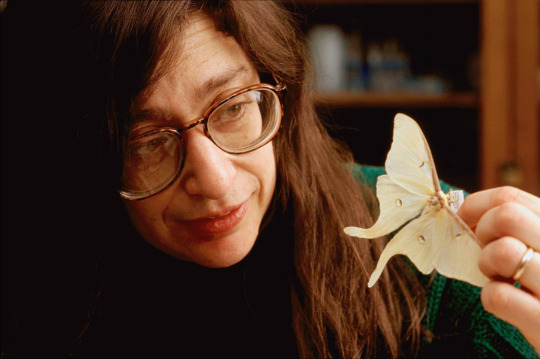

Notable Women in Zoology: Professor May Roberta Berenbaum
An American entomologist with a research focus on chemical communication between herbivorous insects and their host plants, as well as the implications of these interactions on the organisation of communities + the evolution of species.
She is also:
A member of the National Academy of Sciences (and editor-in-chief of its journal, Proceedings of the National Academy of Sciences)
Previously served as the editor of Annual Review of Entomology (1997-2018)
A member of the American Philosophical Society
A fellow of the American Academy of Arts and Sciences
Serves as the head of the Department of Entomology at the University of Illinois
Holds the Maybelle Leland Swanlund Endowed Chair in Entomology (highest title a professor can hold at the University of Illinois)
Awarded the National Medal of Science in 2014
Chaired the Committee on the Future of Pesticides in U.S. Agriculture (2000) and the Committee on the Status of Pollinators in North America (2007)
Has written numerous magazine articles + books about insects for the general public
Organiser of the Insect Fear Film Festival at the University of Illinois
Dr. Bambi Berenbaum, famous entomologist and love interest of Agent Mulder in The X-Files, is named after her
74 notes
·
View notes
Text
re: dnp onscreen "personas" lol. i mean yall know what i mean by that but i feel like explaining it anyway just to be thorough. this is related to what ive been calling The Shift.
2011-2012 was around the time where the barrier between real dnp and the people they played was starting to be fortified. and like, part of it is just, with phils channel once he wanted it to be less video journal-y and more weird experimental short films, he still wanted to entertain people while talking abt his life, so maybe he would stretch a tale a bit or act a bit peppier than he is irl. and with dan, he had concepts literally from the start of what to do with his channel, and how it was inspired by a lot of sketch comedy based channels like communitychannel and [REDACTED]. so its not like it wasnt somewhat personas from the start, but 2012 was when it was cemented, and once they became known for being a duo it was just further self-flanderization. a Phanderization even. like intentionally playing into the ornery guy who makes bad puns and the happy go lucky guy who accidentally says innuendos. real tsukkomi and boke moment.
ok im gonna elaborate on why tatinof was a fanfic now :) this is the PEAK of phanderization, to me it's not a surprise that the cracks in the egg PERSONAS were starting to show bc they were just Fully In Character for like a year or so straight. in tatinof, the serious bitter eye-rolling "ugh dont do a song and dance" guy was dan (The Straight Man) (dont laugh thats just what its called) so of course his counterpart was the silly happy just having fun "i wanna burst into song!" guy was phil (The Fool). but when you watch their making of doc, dan says that HE'S the one who wanted to do the song and dance. if youre an Enthusiast abt dnp, you mightve already known that dan was a huge theater kid and loves the book of mormon n shit. phil likes theater too, but dan LOVES IT like not just watching but Performing. BUT to a regular degular in 2015 just casually watching or a huge fan but hasnt watched every liveshow ever or a phannie who just really believes in the Phanon, this may come as a surprise. phil is the happy silly ball of sunshine right? like ok. these aspects of their personality (dans bitterness and phil's positivity) aren't exactly LIES. but like obviously theyre just humans. this is what Interactive Introverts was TRYING to comment on, but imo i think fell short of its attempt bc in the end they were still trapped in their personas for the sake of Giving The People What They Want
ok i kinda tangented so back to the personas, it's not as if today they are Fully Raw And Real with us on screen, that's just kinda inherently never gonna happen, there will always be shit we don't know about them bc like. it's still a screen. BUT now that they are more real with us, we kinda see the energy of the olden days back, ofc less MegaRandomHyper and more gay millennial waffling. but it's them! cuz they really are so similar to the personas, but there's always an underlying layer of This Is A Bit. when dan's annoyed at phil for something we know he's not genuinely angry ESPECIALLY when we see that phil does it on purpose to rile him up. i think something strange is that, it's not like during 2012-2018 we didnt see stuff like this, dan's always been silly and phil's always been sarcastic, but bc so many people had bought into the Personas of danisnotonfire and AmazingPhil, that ended up being cemented into fic.
ok i wanna ramble on more but maybe ill make a new post lmao
59 notes
·
View notes
Text
🎨 Valerie Jaudon

Valerie Jaudon (b. 1945) - Palmyra - 1982 - 84 x 114 in. (213.36 x 289.56 cm) - oil on canvas
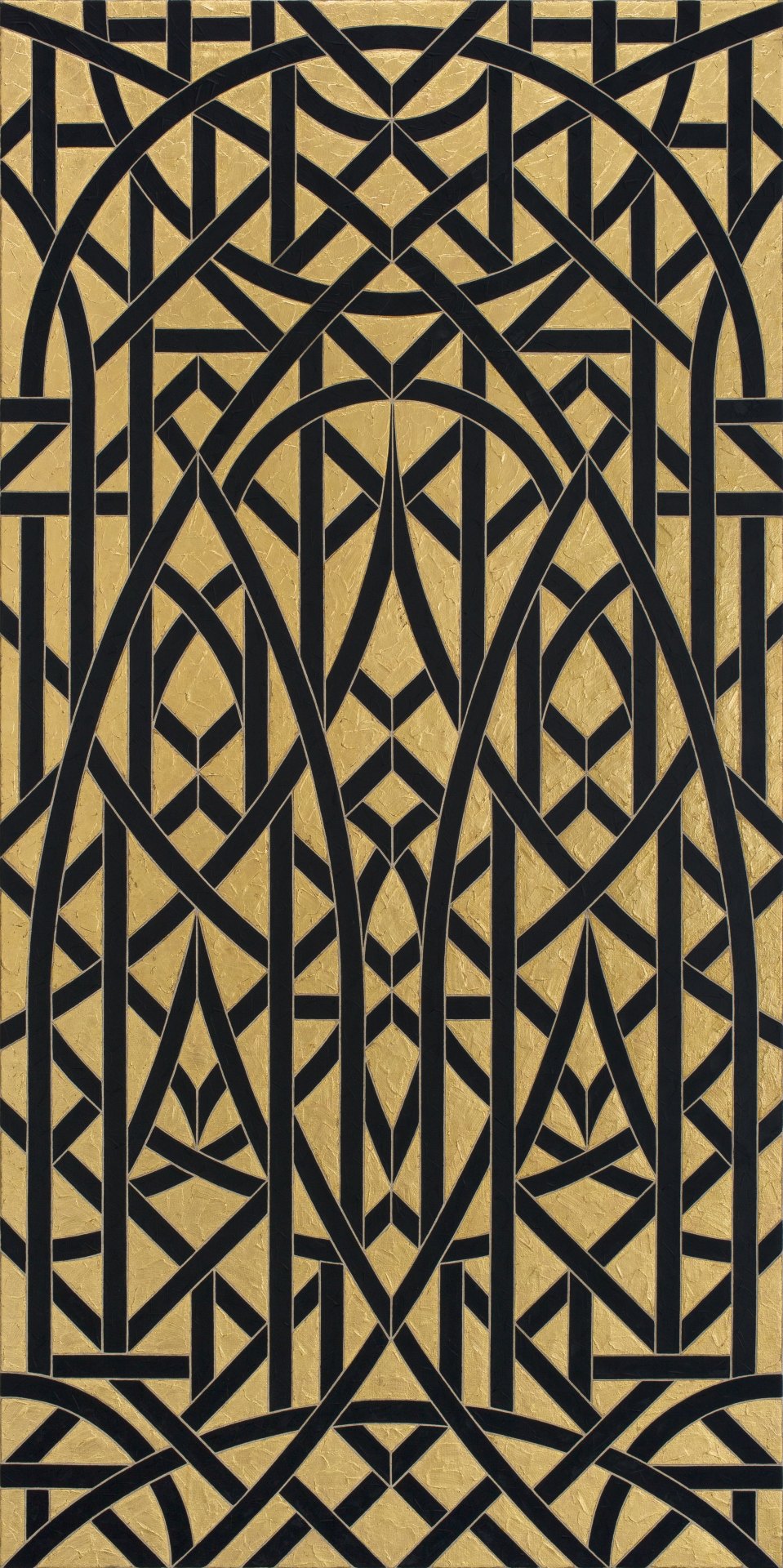
Valerie Jaudon - Big Springs - 1980

Valerie Jaudon - Sebastapol - 1982

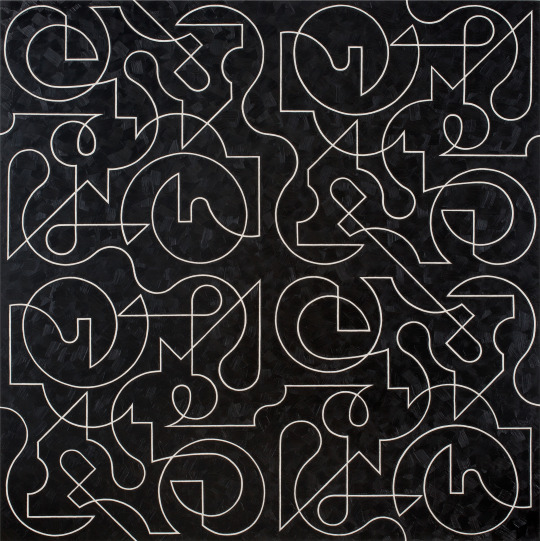
Valerie Jaudon - Quadrille - 2017
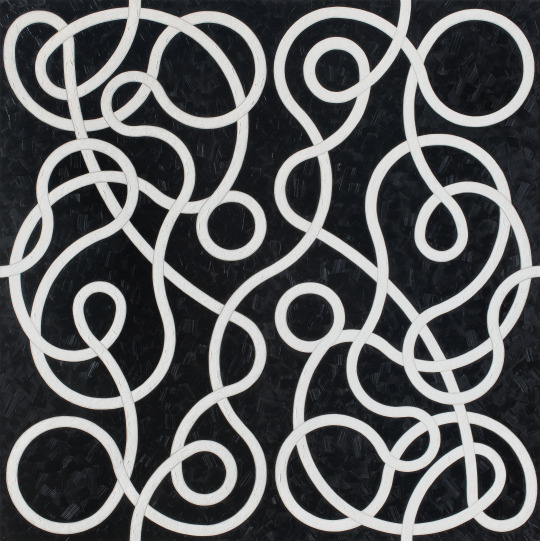
Valerie Jaudon - Passage - 2018
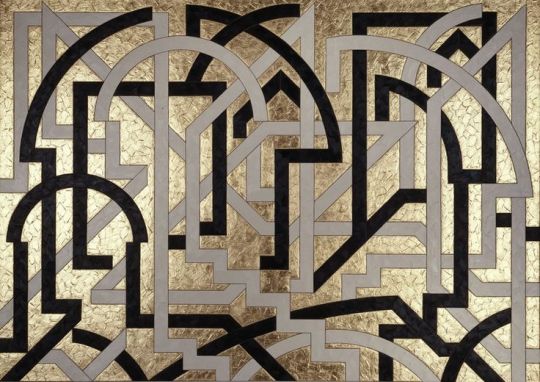
Valerie Jaudon - Egremont - 1985
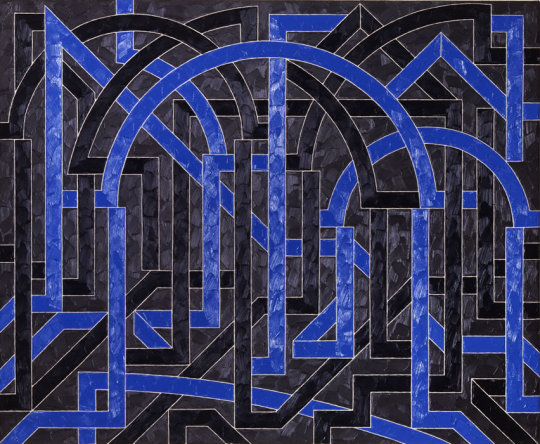
Valerie Jaudon - Manetta - 1984

Arcola, 1982, 81 x 120", oil on canvas
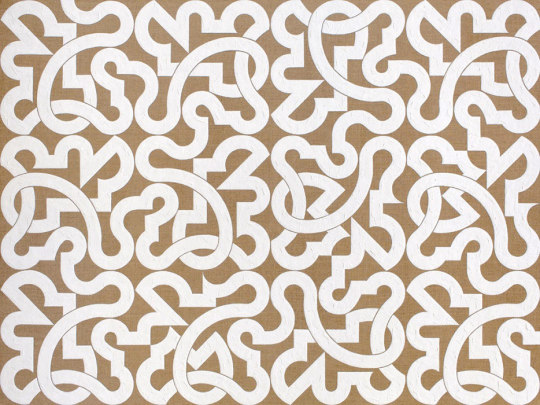
Saraband, 2014, 48 x 48”, oil on linen

Avalon, 1976, 72 x 108", oil & aluminum pigment on canvas
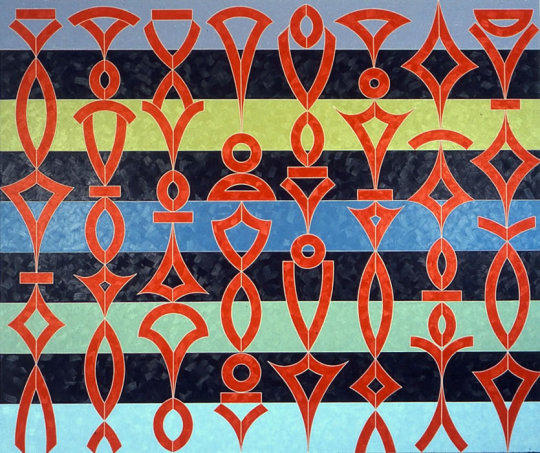
Ballets Russes - 1993, 90 x 108", oil on canvas
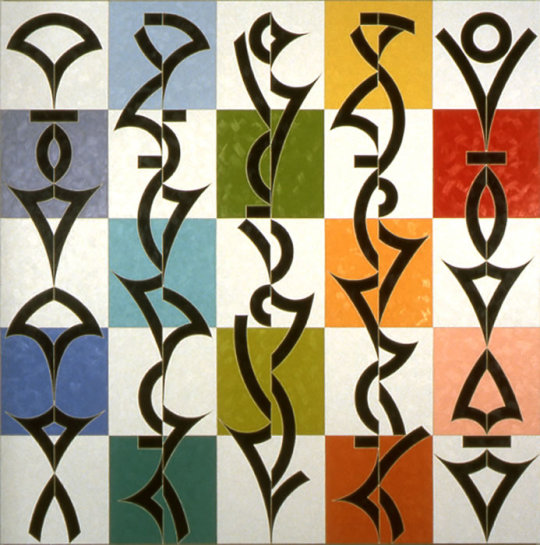
Social Contract, 1992, 90 x 90", oil on canvas

Meridian, 1980, 87 x 121", oil & metallic pigment on canvas
Valerie Jaudon is an original member of the Pattern and Decoration movement. Her art has been written about consistently in books, journals, magazines, newspapers, and catalogs. She is the co-author, with Joyce Kozloff, of the widely anthologized Art Hysterical Notions of Progress and Culture (1978), in which she and Kozloff explained how they thought sexist and racist assumptions underlaid Western art history discourse. They reasserted the value of ornamentation and aesthetic beauty - qualities assigned to the feminine sphere.
Valerie Jaudon
#Valerie Jaudon#art#design#manetta#egremont#Jaudon#quadrille#passage#sebastapol#palmyra#big springs#pattern & decoration#Art Hysterical Notions of Progress and Culture#ballets russes#social contract#sarabande#arcola#meridian
141 notes
·
View notes
Text
Daddy-Daughter Podcast 2023
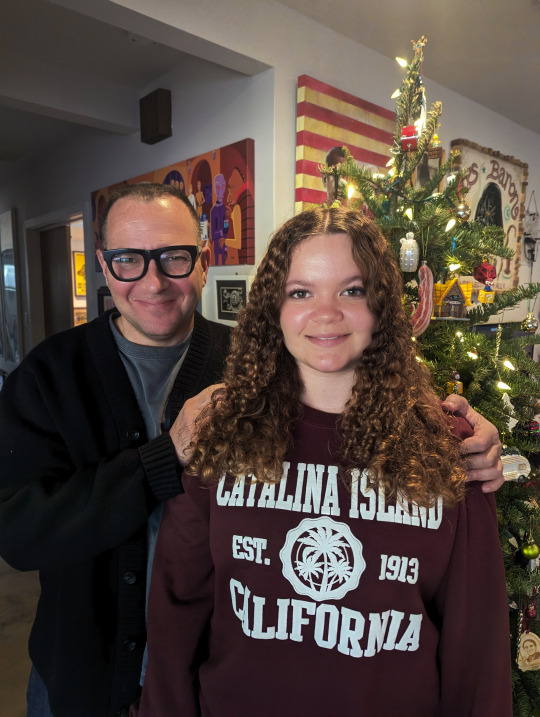
11 years ago, my kid's daycare surprised us by announcing that they were closing for Christmas break a day before everyone else, so I ended up with our then-four-year-old daughter, Poesy, at my office for the day.
After she got bored with coloring and playing with my office toys, I sat her down on my lap in front of my podcast mic and we recorded the greatest, all-singing episode of my podcast ever:
https://craphound.com/news/2012/12/21/happy-hols/
Thus began an annual tradition. Every year since – save one, when my mic was busted – we have recorded a podcast: I interview the kid about her favorite media, apps, books, and hobbies. Sometimes, she gives a tutorial. Then, we sing a song.
She's 15 now (!), and I still managed to drag her to the mic this weekend. We discussed her musical favorites, old (Ike and Tina singing "Proud Mary") and new (Dominic Fyke). We discuss high school, volunteering at the zoo, and the rigors of dance team. She teaches us how to drive. She runs down her favorite apps, and discusses her recent name change. And then, we sing!
https://craphound.com/news/2023/12/10/daddy-daughter-podcast-2023-edition/
This is the eleventh installment in this time-series snapshots of my kid, starting in London, then moving to LA, and every year I go back and listen to the previous recordings. It's not just a wonderful moment of nostalgia for me – it's also a powerful way to put everything into perspective. Anyone who's kept a journal (or a blog!) knows, the act of regular record-keeping, combined with regular revisiting of those records, turns the impressionistic jumble of memory into a clear picture of your life and its trajectory. We remember so poorly, but our treacherous minds fill in those omissions with whatever's going on right now, so if times are good now, we remember all times as good. If times are bad, everything seems bad.
The following year sees Poesy far more confident and even funnier – and excited about working at the zoo someday:
https://craphound.com/news/2013/12/23/christmastime-daddy-daughter-podcast-with-poesy/
At six, Poesy has learned a little French, and some naughty words for Jingle Bells (and she's got a lot more vocal control!):
https://craphound.com/news/2014/12/22/podcast-happy-xmas-guest-starring-poesy/
At seven, Poesy is living in Los Angeles and my mic is very busted, but Poesy knows all the words to Frosty and she's got the barrelhouse walkout nailed:
https://craphound.com/news/2015/12/25/podcast-happy-xmas-guest-starring-poesy-2/
We didn't manage to record the next year, so we catch up with Poesy at nine, with her English accent all but gone – but her memory for lyrics is better than ever (who knew there were so many choruses to "Deck the Halls?"). This is the first time I interviewed her, for an in-depth discussion of how to make slime (remember slime?):
https://craphound.com/news/2017/12/23/reviving-my-christmas-daddy-daughter-podcast-with-poesy/
At ten, Poesy is now watching online makeup tutorials and has lots of advice for you, and is super into squishies:
https://craphound.com/news/2018/12/24/christmas-podcast-with-poesy-2018-edition/
At eleven, Poesy's no longer willing to sing, but she has lots of information about riding horses. This is the first year that she's got her own music preferences, with half of them being contemporary artists like Billie Eilish and the other half being older acts like Queen. This is also the year that she got rid of all her old toys, books and clothes, because they were "not her style":
https://craphound.com/podcast/2019/12/20/my-annual-daddy-daughter-xmas-podcast-interview-with-an-11-year-old/
Twelve sees us podcasting from covid lockdown. No song this year, but she's playing video games (Among Us), thrifting (while double-masked), and she's just discovered Tiktok, along with Tiktok dances, and she's started to find cool music that I enjoy:
https://craphound.com/news/2020/12/11/daddy-daughter-podcast-2020-edition/
At thirteen, Poe's a high school freshman and the singing is back! She's big into Drag Race and Ru Paul. And high school sucks so hard that she'd rather go back to Zoom school. She's still riding horses, and she's fallen in love with a book for the first time in years: Animal Farm (but she hates the ending):
https://craphound.com/news/2021/12/23/daddy-daughter-podcast-2021-edition/
Last year, Poesy was fourteen, and my office had just flooded out in a freak rainstorm. Poesy has discovered her argumentative nature, and she loves hiking in nearby Angeles National Forest. She's getting into hiphop – Eminem, Snoop Dogg, and Cyprus Hill – and South Park (also Fleetwood Mac!). We get a lot about Big Mouth, and a long discussion of her short fiction writing:
https://craphound.com/podcast/2022/12/12/daddy-daughter-podcast-2022-edition/
These annual time-capsules are just tremendous. I may not have had the discipline to do daily, time-lapse ready photo portraits, but this corny, silly yearly tradition is more than a way for my kid and me to spend a few minutes together just before Christmas – they're a way to connect to our past and think about the future to come. I can imagine doing these over Zoom when the kid's away at university in a couple years, though who knows if she'll stand for that.
Here's the podcast episode:
https://craphound.com/news/2023/12/10/daddy-daughter-podcast-2023-edition/
And here's a direct link to the MP3 (hosting courtesy of the Internet Archive – they'll host your stuff for free, forever):
https://archive.org/download/Cory_Doctorow_Podcast_457/Cory_Doctorow_Podcast_457_-_Daddy_Daughter_Podcast_2023_Edition.mp3
And here's the RSS feed for my podcast:
https://feeds.feedburner.com/doctorow_podcast

If you'd like an essay-formatted version of this post to read or share, here's a link to it on pluralistic.net, my surveillance-free, ad-free, tracker-free blog:
https://pluralistic.net/2023/12/11/daddy-daughter-2023/#not-bye
90 notes
·
View notes
Text
How Funding Affected my Journalism Jobs
The different places I’ve worked as a journalist, and in related fields, have all had different funding. Here are my experiences at different places–and it seems to me that grant-funded stuff is the best.
Internship at Nat Geo
Grants sponsored both of the other interns, but not me. Nat Geo makes a lot of its money through things like books at TV.
Mine was low-paid, but probably normal for an internship in 2016? LOVED the experience. Freelance at Nat Geo afterward was MUCH better paid. $14/hour part-time. IDK how much the grant-funded interns made. 2016.
Fellowship at PBS Newshour
A grant from the National Science Foundation funded me, but PBS is state-sponsored media. Interestingly, that’s a huge red flag in China and Russia, but I found the US-funded Public Broadcasting Service very fair to its subjects. Good experience, but even worse pay, at $13/hour full-time. 2016-2017
Job at Newsweek
Their funding is from clicks. This place was crazy bad and paid garbage. Everyone hated it and almost everyone quit, unless they were being fired for making a living wage. Some people even got fired for accurately reporting on the company itself on assignment from their editors–there was no obscuring it, that was cited as their reason for termitation. Newsweek is Hellfire and damnation. I suspect the nonsense demand for 5 stories/day/person and silly demand that we make them go viral stemmed from the following: the fact that the company primarily made its money from clicks and higher-ups didn’t appear to care about the long-term reputation of the company or its reporters, and perhaps an ego-fueled refusal to try to understand what actually got clicks. $39k/year. 2017-2018
Freelance at VOX
Funded by clicks/ads and grants at the time, but halfway through they started a contribution campaign. The difference I noticed between VOX and Newsweek was that VOX practices were smarter and they actually paid attention to analytics and sane business practices. Also, it's much easier to qualify for and get grants if you're actually doing good journalism, so I don't believe that Newsweek's policy of "lots of garbage" was actually business-savvy in any way.
Vox was a good experience, even though I wasn’t working as a journalist, but doing SEO/social media for journalists. $35/hour, then $50/hour part-time. Then I was laid off due to the pandemic. 2019-2020
Freelance at Alzheimer's Association
Remote, not really journalism, but I liked it anyway. Nonprofit, so, funded by donations and grants. $65/hour part-time. 2021
Job at Bay Nature
My job was entirely funded by a grant. Odd situation–I got the grant and I could bring it to any legit journalism employer. Bay Nature was supposed to contribute 40% of my salary but flexibility happened and they just paid health insurance and such. They got basically no money at all from clicks, like, pennies a year. Not much from subscriptions. They have fundraisers, and at the time, there were 3 writers/editors and 2 fundraisers on staff. Later they hired another writer whose entire salary was paid by a philanthropist, and then I’m told they got another salary funded by a UC Berkeley journalism grant program. So, like half of their editorial staff was grant-funded.
Great experience, but low pay for the Bay Area. $50k/year, all from Poynter-Koch, 2021-2022.
Freelance at Politifact
A nonprofit and they probably get lots of grants. My particular position was also funded by a grant entirely. Loved it. $250/article fact check. 2022.
Book
REALLY love it. $50k is from MIT Press, which is a not-for-profit, and it gets some grants and endowments. Then I got $56k from a grant from the Sloan Foundation on top.
Future?
I also got $500 (plus gas and hotels) to attend a day of learning with a program called Investing in Wyoming’s Creative Economy, and that means I’m one of 100 people eligible to apply for 10 $25k grants for future projects. The idea is to support creatives to stay in Wyoming and have sustainable businesses here. Maybe do some art that will bring in tourists.
_____________________
Note that a grant sort of does, and sort of doesn’t, mean free money. It means money to support a project that usually has to have a mission and a public good, like educating the public. You don’t pay these back, and the org giving the grants doesn’t require a percentage of the profits or anything. But, for instance, the $50k grant from Poynter-Koch was more like a gift to Bay Nature, so they could pay me, and I worked for a year to actually have the funds.
However, I’m not yet convinced that there is any objectively good funding model to ensure the most fair and accurate journalism. In theory, the capitalistic ones would be the best, but the public desire to read inflammatory stories about how their political enemies are evil, or a different generation is full of idiots, adversely affected the accuracy of headlines at Newsweek IMO.
You might think that the worst funding source would be Poynter-Koch, which is a program run by Poynter and funded by the Charles Koch Institute. But neither Poynter nor Koch even asked me to tell them what I was writing, let alone try to stop me from writing it. (Poynter hosted mentor-led auxiliary groups to talk about our careers/lives and such, so the topics of our articles came up sometimes if we chose to share that.)
Anyway, I’m thinking of writing an article on how funding models affect journalism, for better and worse. There are some high-profile examples of grant funding causing harm. But for now, the above is my experience–pretty much all good, except not enough funding sometimes.
59 notes
·
View notes
Text
Johnny’s Journal Excerpt
Friday 6/4/2018
I go on a mission tomorrow. It’s a hard one too, like I have to infiltrate a secret society. I’ve only just started doing my specialist training. Why me?
I don’t know the first thing about the crusades or anything and I have to learn all of this in two months.
I’m sat here with 6 books about the Third Crusade and Robert de Sablé. WHO THE FUCK IS ROBERT DE SABLÉ? I swear we didn’t learn this in school and now I have to read about it.
Oh well, if it’s for the mission then I have to do it. I can’t back out, not when this is a chance I can finally prove myself to take on more challenging missions.
Location: Masyaf, Syria.
Objective: what are they looking for.
I’d tell you more but if anyone finds this I’m as good as dead.
Chapter 1 - out soon
#cod original character#call of duty#call of duty modern warfare#cod#cod mw2#cod mwii#cod oc#ghost cod#soap call of duty#soap cod#cod mw3#cod modern warfare#call of duty fanfic#johnny soap mactavish#john soap mactavish#john price#simon ghost riley#kyle gaz garrick#captain john price#call of duty soap#dad!soap
38 notes
·
View notes
Note
what if the reader likes to journal and shes been keeping a journal where she writes about her relationship with (guy of your choice) before they were like dating or something up until now and she gives it to them on their birthday and it’s all emotional and stuff.

“you kept those?!”
adam fantilli x reader
word count: 1k
sorry i couldn’t help myself but pick adam!! he’s too underrated ugh, but anyways this idea is so so so cute!
you and adam have been friends since before you can even remember. your moms were college roommates throughout all four years of university at michigan. so when they found out that you and your older brother drew, who’s the same age as luca, got into michigan, and that fantillis would be playing hockey there, everyone around you was ecstatic.
your feelings for adam began in the third grade, and you’re a freshman in college now. you guys began dating last year, and everyone was waiting for it to happen. you guys were clearly meant to be, according to both your families and friends, but nothing ever happened until now. of course you’ve had other boyfriends before and he’s had girlfriends, but deep down you always knew that he’ll forever be your first love.
when you starting having these ‘tingly feelings’ around him, as your 10 year old self described them, you decided to keep a diary. you would write in it every time you and adam had cute moments, and you still write in it sometimes. you’ve already filled up one whole diary, and you’re halfway done with another one, but being in college now, you don’t really have the time to write in it. so you thought, why not give the diaries to adam for his birthday?
written in the diaries are things like how once he cut you a slice of pie at the annual fantilli’s friends-giving, or even how you would get jealous that he was playing chel with your older brother instead of hanging with you. the first diary is from third grade to seventh grade, and the second one is eight grade till now.
—
you and adam drove about forty-five minutes to detroit, to eat at a fancy resturant everyone has been raving about. you’re sat at a candle lit table in a restaurant, with a view looking over the city, when the perfect moment comes up to give him the diaries.
“so as your birthday gift this year, i didn’t get you much, but i thought maybe you’d enjoy something a little more sentimental.” you say shyly, as you reach into your purse to grab the two old diaries.
adam let’s out a little chuckle, as he reaches across the table to grab them from you. “holy crap! you kept these?! i remember seeing these in your bedroom as a kid, you’d never let anyone touch them. i remember once me, luca, and drew tried to steal it from your room and you started screaming and hitting us” adam laughs, making you blush from embarrassment.
“yeah well you’ll see why when you open them.” you say, embarrassed that you’re letting him finally read all of the diary entries you’ve written about him over the years.
he cracks open the small book in his hands, and begins to attempt to understand your messy elementary school hand writing. he reads through a few pages and you both laugh about it, and he switched over to the other diary. he opens it to a random page, which happens to be from freshman year.
october 31st 2018
dear diary,
it’s halloween night, and this is the first year since fourth grade that we haven’t gone out together. me and adam swore to never stop trick or treating until we’re both old enough to drive, so that we can go to parties together, but looks like him and his new girlfriend have other plans. adam keeps sending me a bunch of snapchats of him at this stupid party with her head on his shoulder. it doesn’t help that luca and drew went out to a party too, so now i’m at home trying not to cry. i hate having a crush on adam, i never want to feel like this again.
adam looks up from the diary and gives you a small pitiful smile, making you hide your face in embarrassment, “i regret giving you these!” you groan and hide your face in your hands. he reaches across the table and takes your hand in his.
“don’t be embarrassed, i think these are super cute. they’re warming my heart. i can’t wait to read the rest of them, and if it makes you feel any better i had a crush on you during like half of these too. you think i really liked fiona that much? i remember i kept thinking how much i wanted to be trick or treating with you instead.” he blushes.
“you’re just saying that!” you laugh, unbelieving of what he’s saying.
“i’m dead serious! why else would i be sending you snaps you while i’m at a party. i really only dated her cause i was just tired of always getting chirped for not having a girlfriend, she she had a crush on me,” adam chuckles, making you giggle a little bit at the thought.
“i was always right there, y’know”
“i know that now, and boy do i wish i could go back in time and do it all differently. you don’t know how bad i wished i was the one who took you to homecoming freshman year. me and fiona weren’t even matching colors! oh and don’t even get me started on homecoming junior year. you went with one of my teammates, i was pissed!”
“well hey, you did take me to senior prom!” you chuckle a little, looking at your lockscreen photo of the two of you from last year.
“because we were dating then! that doesn’t count”
“yes it does adam! plus all of the stupid relationships we got into during high school just proves we were bound to be” you cheesily grin, making adam smile as well.
“yeah i guess so, but seriously if i could go back and change it all i would. i would’ve asked you out like, i dunno, five years ago!”
“oh sure, cause you definitely had the balls to do that. the real question is, wouldn’t our braces have gotten caught in each other?” you joke, remembering how ugly you both looked with braces five years ago. adam laughs, almost spitting out his water, making you and him both laugh even harder. you guys get a few stares from the older adults around you guys, but you both don’t care. you’re just enjoying the moments with the man you finally get to call yours.
#adam fantilli#adam fantilli x reader#adam fantilli imagine#adam fantilli blurb#umich hockey#hockey imagine#hockey blurb#michigan hockey
216 notes
·
View notes